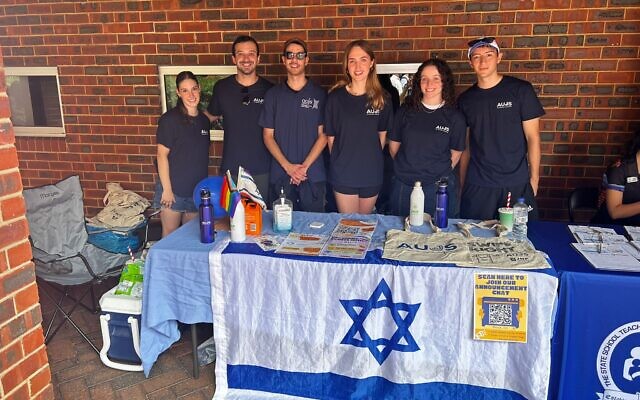As the threat grows, so do we
Jewish students feel more threatened than ever and are naturally drawn to a sense of community they wouldn’t otherwise actively seek.

As anti-Israel rhetoric and antisemitism become increasingly rampant on campuses across the world, Jewish students feel more threatened than ever and are naturally drawn to a sense of community they wouldn’t otherwise actively seek.
This became evident to me during my visits to nearly a dozen campuses throughout Australia and New Zealand during the month of February for Orientation Week (O Week). Student societies and clubs use O Week to introduce themselves to students and potential new members. Visiting stalls run by the Australasian Union of Jewish Students (AUJS) allowed me to witness first-hand the challenges Jewish students are facing right now and the coping mechanisms they rely on.
During my visits to AUJS stalls in Sydney, Melbourne, Adelaide, Perth and Auckland, I encountered numerous incidents of verbal abuse, Israeli flags being ripped down and torn and constant gestures and smirks that would make anyone feel vilified and unwelcome.
While more incidents were reported in Melbourne and Sydney, smaller regions face the same challenges while often lacking the sufficient resources and support to tackle them. In Adelaide, “Free Palestine” pins were left on our designated table before we got there. In Perth, a student came to our stall and confidently stated, “Israel has killed more people than Nazi Germany did.” I would not have classified this as an incident if that student had not been on the university’s student guild – the main body in that university that is responsible for representing all students on campus. And in Auckland, the Auckland University campus was riddled with posters that read: “Zionists are not wanted here,” alongside a picture of a local Jewish lecturer.
Campuses in Melbourne and Sydney are usually more receptive to their relatively large number of Jewish students and are more inclined to take adequate action to ensure their safety. That is not always the case in the smaller regions.
And still, it’s not all bad. Despite the challenges, the situation is not as dire as we feared it would be. Not yet, at least. The threat should not be underestimated, of course, but I did encounter many incidents that left me more optimistic than I was before departing on my month-long journey. The vast majority of the non-Jewish students who I met were not as invested in the war as I expected. Many curious students came up to ask reasonable questions about the situation and were genuinely interested in a discussion. Others were looking to learn more about Jewish culture and Hebrew and did not bring up Israel or the war at all.
In more confrontational situations, our members were mostly able to defuse the situation while not shying away from advocacy. Israeli flags, which were a contested issue for some prior to O Week due to security concerns, proudly hung at every stall I visited. And while AUJS did provide students with numerous workshops on advocacy and de-escalation post October 7, I couldn’t help but notice the passion in which these young adults were engaging with their peers. For many, the threat is no longer theoretical, but very tangible and personal, and AUJS has shifted from being a mere extracurricular activity to a mission worth fighting for.
But perhaps the most encouraging was the significant amount of new sign ups. At this point last year, AUJS had 543 members, while this year we are already at 917, marking nearly a 70 per cent increase. AUJS New Zealand alone doubled its membership base from 40 to 80. Many of the new sign ups there were Americans on student exchange programs who said they were extremely relieved to see a Jewish club on campus.
The fight is far from over, of course. March has been dubbed “March for Palestine” month by pro-Palestinian groups and friction on campuses will undoubtedly continue to increase. In many ways, O Week has provided Jewish students with a relatively safe space to express their Jewish and Zionist identities. With less security and monitoring by universities, unfortunately more incidents are likely to occur.
We’ve already seen increased pro-Palestinian activity on several campuses since O Week, sometimes endorsed by the universities themselves. We’ve received multiple complaints of academic staff raising the issue in class while focusing solely on the Palestinian narrative. The rhetoric is becoming more extreme as well. An event held recently at Auckland University explored the “need to push the boundaries of the law” in order to make pro-Palestinian protests more efficient, which poses potential terrifying ramifications for Jewish students.
To address these issues, AUJS has been working closely with the Australian Academic Alliance Against Antisemitism (5A), which comprises a network of over 200 academics from 24 universities across Australia. We’re currently working on starting a branch of the organisation in New Zealand. Another focus has been reaching out to other student societies in an effort to form new relationships and strengthen old ones. At a time when some are trying to isolate us, building bridges is more important than ever.
There is still much to do, and we probably haven’t seen the worst of it just yet. But as the threat grows, so do we, and so does our commitment to supporting Jewish students everywhere.
Tobias Siegal is the shaliach of AUJS.

comments